Remembering Manchester’s forgotten high street stores
- Written by Thom Bamford
- Last updated 11 months ago
- Cornerstone, History
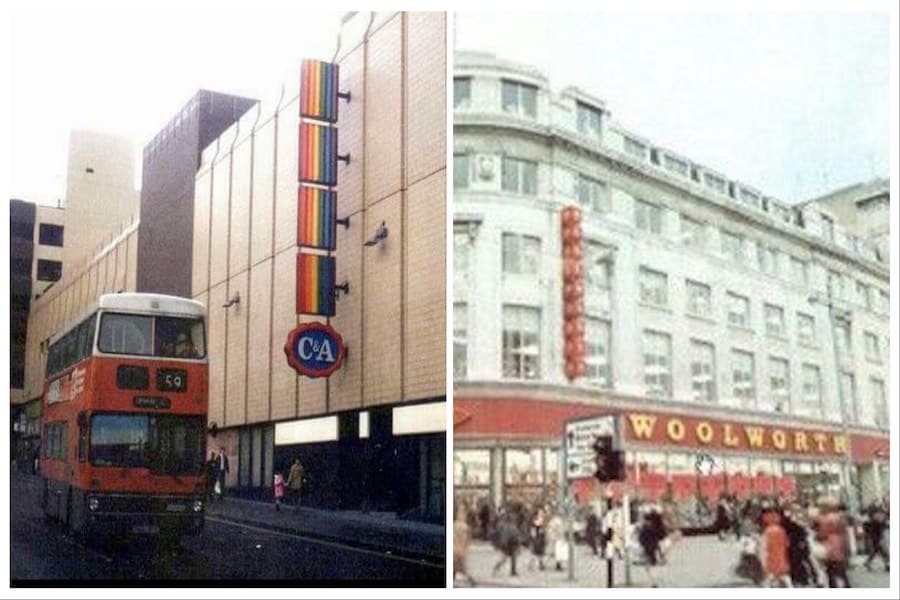
Let’s reflect on Manchester’s Forgotten High Street Shops.
Over the years, numerous shops and retailers have graced the bustling thoroughfares of the city.
From iconic department stores to quirky independent boutiques, these establishments were more than just places of commerce – they were cherished by generations of shoppers.
In this article, we embark on a sentimental journey down memory lane, paying tribute to the forgotten high street shops that have either closed down or faded away from Manchester’s retail landscape.
While the city’s shopping scene continues to evolve with the times, it is crucial to acknowledge and preserve the legacy of these bygone gems that once brought joy, excitement, and convenience to countless shoppers.
Manchester’s Forgotten High Street Shops
Stolen from Ivor
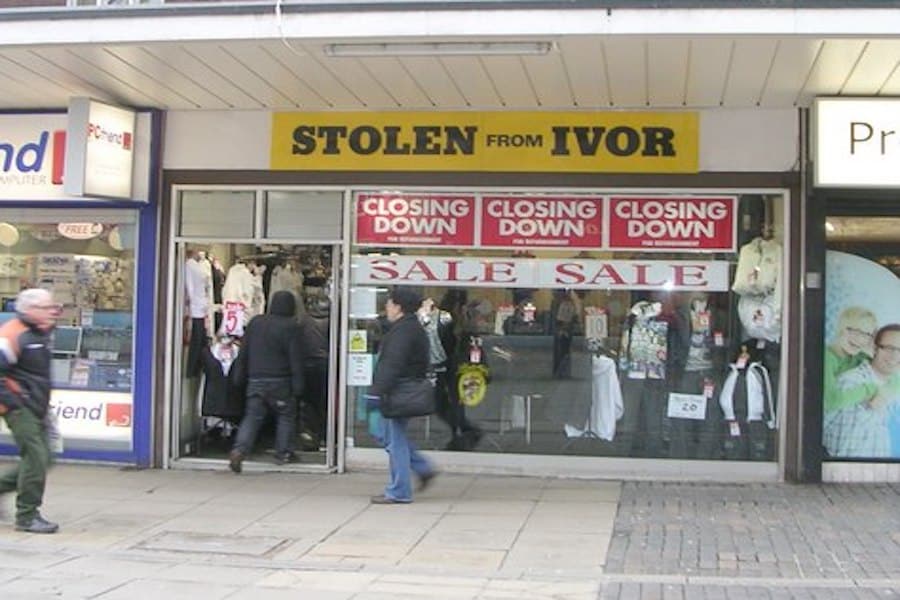
Stolen from Ivor was a renowned fashion boutique that held a special place in Manchester’s retail landscape.
Founded by Ivor Hazan in 1965, the boutique quickly became a mecca for fashion hipsters and style-conscious individuals across the region.
Its location on King Street West in Manchester city centre made it easily accessible to shoppers.
The boutique was known for its curated selection of trendy and unique clothing pieces, which set it apart from traditional high-street fashion stores.
Stolen from Ivor offered a carefully curated collection of fashionable apparel that appealed to the city’s discerning and fashion-forward crowd.
Kendals (House of Fraser)
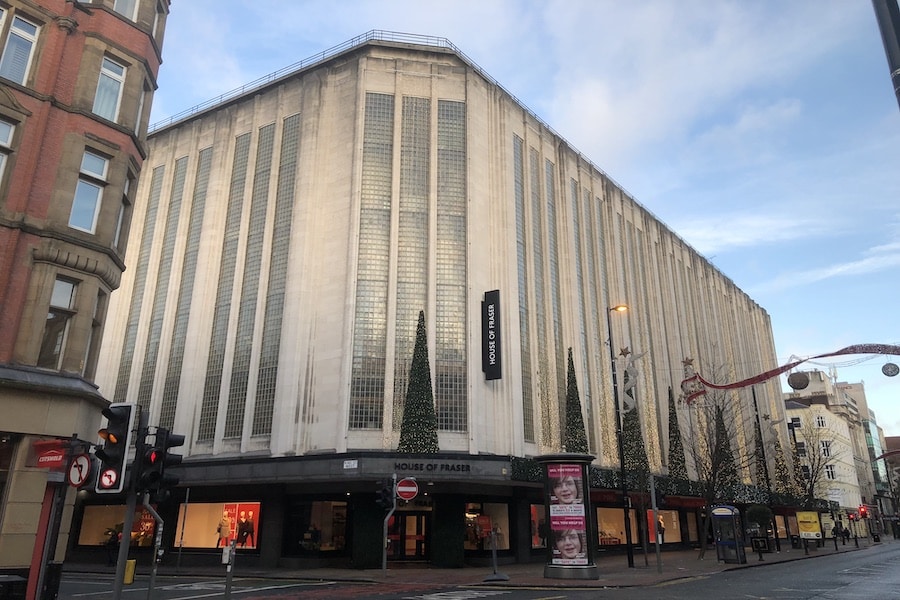
Kendal’s was a high-end department store located in Deansgate, which House of Fraser now occupies
It boasted a rich history, having operated since 1832.
After a series of ownership changes and rebranding, Kendals eventually became House of Fraser.
Oi Polloi
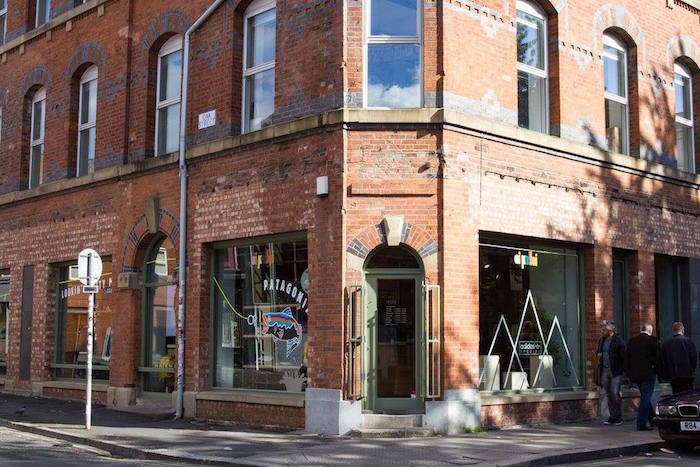
Although only a temporary absence according to owners, Oi Polloi is a much-loved clothing store, formerly located in the Northern Quarter.
Oi Polloi was founded by Steve Sanderson and Nigel Lawson and sells a menswear range from brands such as Keen and Patagonia.
Even Liam Gallagher was a fan.
Now, the founders have sought to set the record straight on the future of the Oi Polloi brand by issuing a statement on social media.
They have said that the clothing brand has “not bit the dust” but has gone into “hibernation”, and encouraged followers to subscribe to its newsletter for “exact battle plans”.
Taking to Instagram, owners wrote: “There’s been a few rumours boy-racing down the information superhighway these past couple of months regarding Oi Polloi’s future, so it’s time to set the record straight – no, Oi Polloi has not bit the dust.
“We are having to go into hibernation for a bit, but like a phoenix rising from the ashes of a torched public-use e-bike, we will rise again.
“Huge changes are on the horizon, some good, some not so much… so let’s start with that.
“Unfortunately, our beloved Manchester outpost on Thomas Street has sadly retired to the big pearly white retail park in the sky.
“We’d like to thank everyone who ever came down to the shop to buy something or just to have a good ol’ chinwag, and without getting too teary-eyed, we’re absolutely gutted to say goodbye to our Mancunian stronghold and all those who passed through its hallowed doors – customers and staff members alike.
“That being said, Oi Polloi will live on, albeit in a metamorphosed form – we’re going back to the source of the Oi Polloi wellspring, taking a dip, then marching into hitherto uncharted zones with an invigorated pep in our step.
“We’ve got to remain tight-lipped about our exact battle plans for now, but you can stay updated by subscribing to our newsletter (link in bio), as well as keeping a keen eye on our socials. We’ll see you soon. Oi Polloi.”
Watch this space….
Pauldens
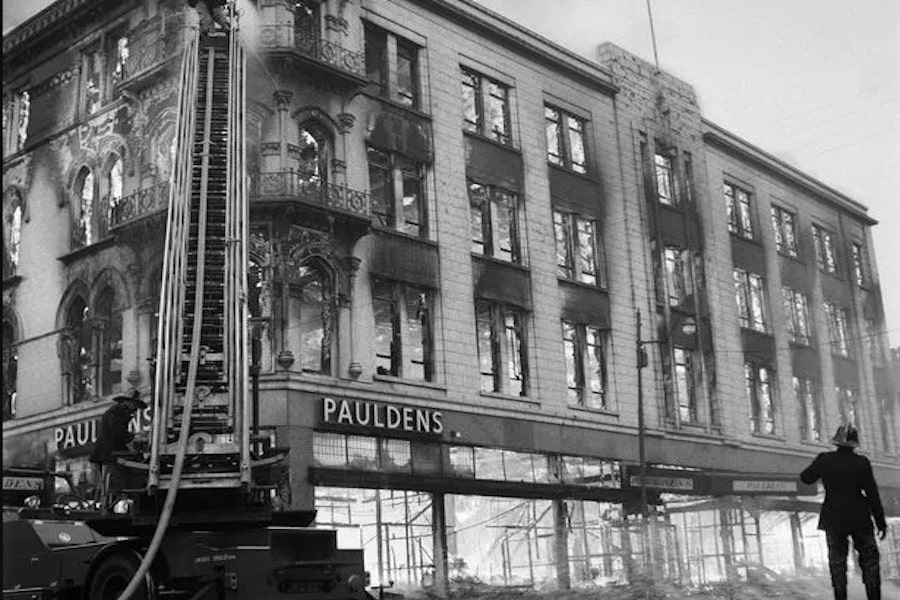
Paulden’s, a historic shopping destination in Manchester, made a significant impact on both retail and architecture over a century ago. Originating in the 1860s, it introduced a luxurious shopping experience to Manchester residents, pioneering electric lighting, escalators, lifts, and plate glass windows in the UK.
The forward-thinking store owners were among the first to explore a delivery service, utilising cars for efficient transportation. Innovative sales strategies included captivating window displays and in-store entertainment, featuring live music, mannequin parades, and special events during holidays like Easter and Christmas. Notably, the basement housed a farm where children guessed the number of Easter eggs to win a puppy.
According to The National Archives, staff wore navy and yellow or navy and silver uniforms, transitioning to “evening dress” in the afternoon. The department store, cherished for generations, remains a nostalgic memory for its diverse offerings, from furniture sales to its beloved café.
Originally situated on Cavendish Street, the iconic store’s location is now occupied by Manchester Metropolitan University’s Cambridge Hall of Residence.
In 1957, Pauldens experienced a major makeover, but just before the grand reopening, it fell victim to a devastating fire. The origin of the fire remained a mystery, leaving investigators unable to determine the cause. Despite this setback, Paulden’s quickly resumed operations in a temporary space located in an army barracks on Medlock Street.
In 1959, the store made a triumphant return, reopening in the former Rylands Warehouse situated at the intersection of Market Street and Piccadilly Gardens.
It re-branded to Debenhams in the 1990s.
Woolworths
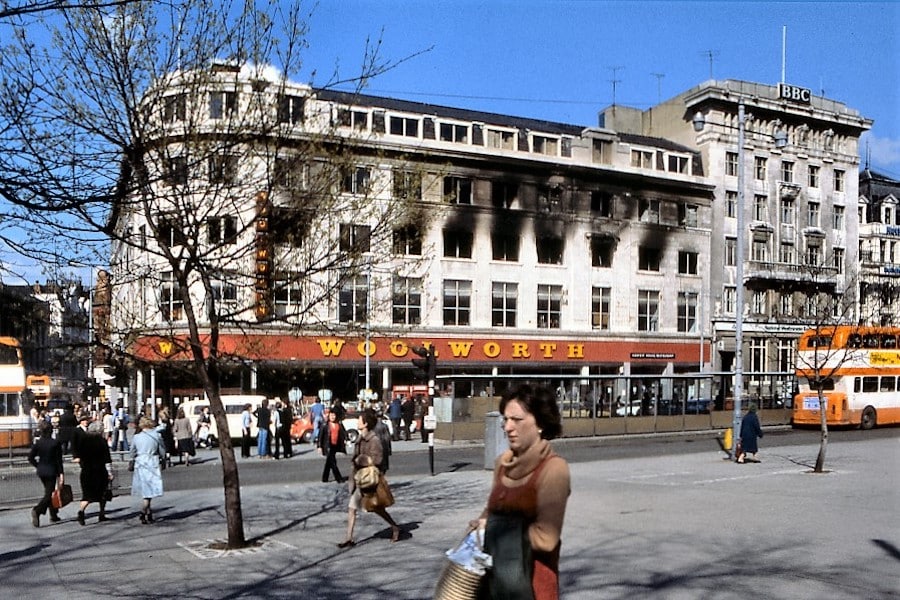
One of the most iconic high street stores, Woolworths, was a staple in Manchester for decades.
Known for its diverse range of products, from toys to stationery, it was a go-to destination for families and bargain hunters alike.
One of the most significant aspects of Woolworths was its “pick ‘n’ mix” sweet counter, which allowed customers to select a variety of sweets of their choice.
This feature was particularly popular among children and remains a nostalgic memory for many.
The doors of Woolworths’ Manchester branches closed for the last time in 2008, leaving behind only memories.
Lewis’s Department Store
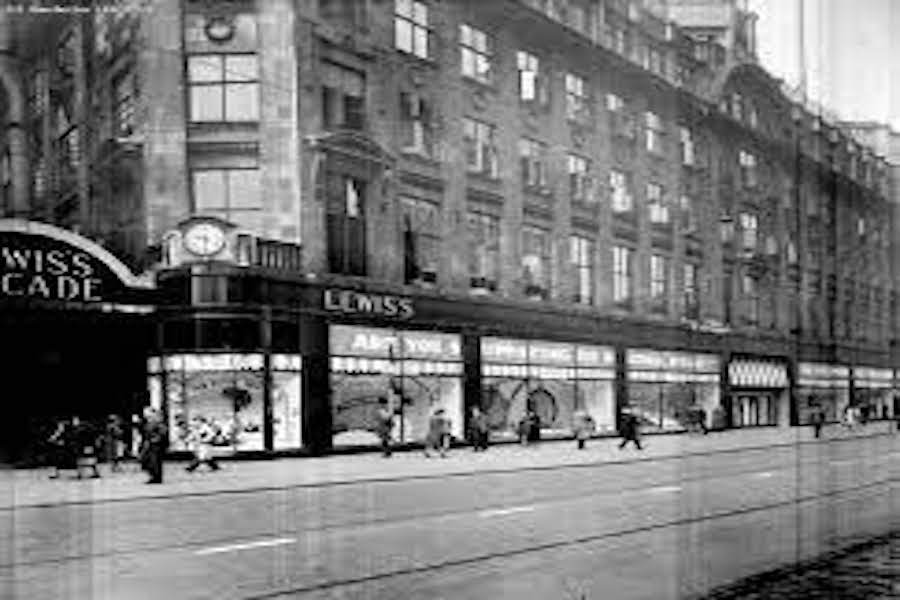
Lewis’s was a historic department store in Manchester, attracting shoppers for over 150 years.
The story of Lewis’s in Manchester began in the mid-19th century when it was founded by David Lewis in 1856.
The store quickly gained popularity for its diverse offerings, including clothing, cosmetics, household items, furniture, and much more.
With its prime location on the bustling Market Street, Lewis’s became a central hub for shoppers and a symbol of the city’s retail prosperity.
It had an impressive array of goods, including clothing, cosmetics, and household items.
Unfortunately, Lewis’s faced financial struggles and closed its doors in 2001.
Virgin Megastore
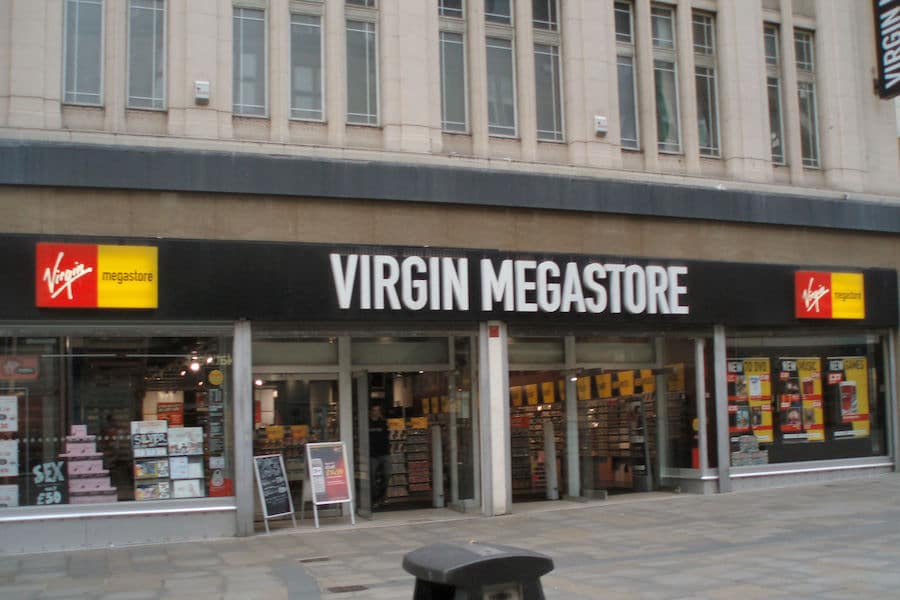
While the digital age has revolutionised the way we consume media, music enthusiasts will always cherish the memory of Virgin Megastore.
With its vast collection of CDs, DVDs, and vinyl records, this iconic store on Market Street was a paradise for music and movie lovers.
The rise of online streaming, however, led to the eventual closure of Virgin Megastore in Manchester, leaving a hole in the hearts of those who spent hours browsing its vast collection of records, CD’s (maybe even minidisks), and tapes.
Littlewoods
Littlewoods was a well-known retail chain that had a significant presence in Manchester for many years.
Founded in 1923 by Sir John Moores, the company started as a football pools betting business.
It later expanded into mail-order retail, offering a wide range of products from clothing and homeware to electrical appliances and toys.
Like many traditional brick-and-mortar retailers, Littlewoods faced challenges in the face of changing consumer habits and the rise of online shopping. The company tried to adapt to the digital age by launching an online platform, but it struggled to compete with larger e-commerce giants.
Unfortunately, the challenges proved insurmountable, and in the early 2000s, the decision was made to close the Littlewoods Manchester store.
C&A
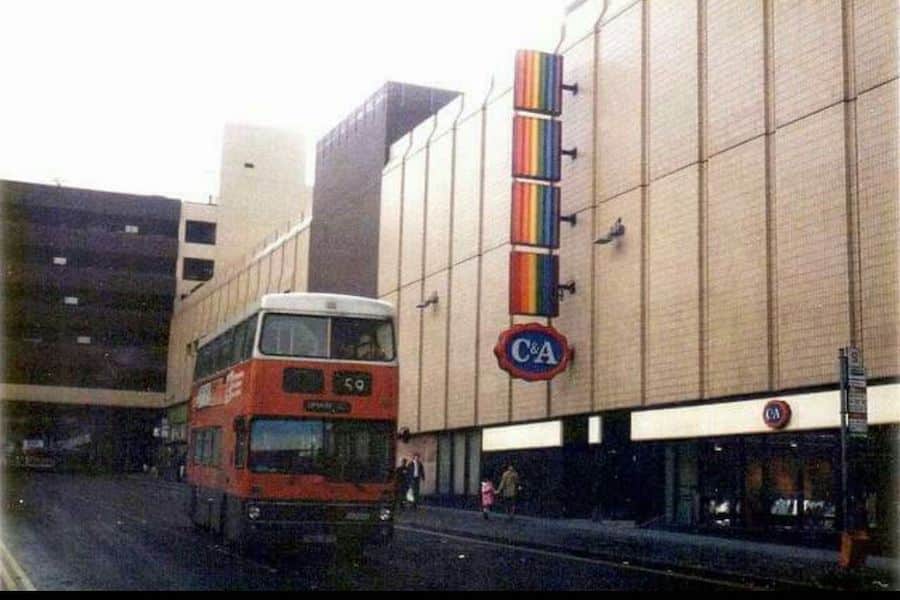
This Dutch-based clothing retailer had a strong presence in Manchester during the ’80s and ’90s. C&A offered affordable and fashionable clothing for all ages, but it struggled to keep up with changing consumer trends and competition, leading to its eventual closure in the early 2000s.
During its heyday in the ’80s and ’90s, C&A adorned the city’s streets with fashionable clothing for all ages.
Unfortunately, changing consumer preferences led to its eventual decline and departure from the high street in the early 2000s.
Are there any we’ve missed? Let us know! [email protected]
- This article was last updated 11 months ago.
- It was first published on 3 August 2023 and is subject to be updated from time to time. Please refresh or return to see the latest version.
Did we miss something? Let us know: [email protected]
Want to be the first to receive all the latest news stories, what’s on and events from the heart of Manchester? Sign up here.
Manchester is a successful city, but many people suffer. I Love Manchester helps raise awareness and funds to help improve the lives and prospects of people across Greater Manchester – and we can’t do it without your help. So please support us with what you can so we can continue to spread the love. Thank you in advance!
Got a story worth sharing?
What’s the story? We are all ears when it comes to positive news and inspiring stories. You can send story ideas to [email protected]
An email you’ll love. Subscribe to our newsletter to get the latest news stories delivered direct to your inbox.

Meet the pear, tomato and banana who are changing the way we fight hate crimes in Manchester

How Mandem Meet Up and The Lowry Hotel are improving men’s mental health this Movember

The failed utopian housing project that became a bohemian counterculture ‘paradise’

Escape to the Aegean this Winter with chef Zisis Giannouras at Fenix

Green, grand and gorgeous – a deep dive into the redevelopment of Albert Square
















